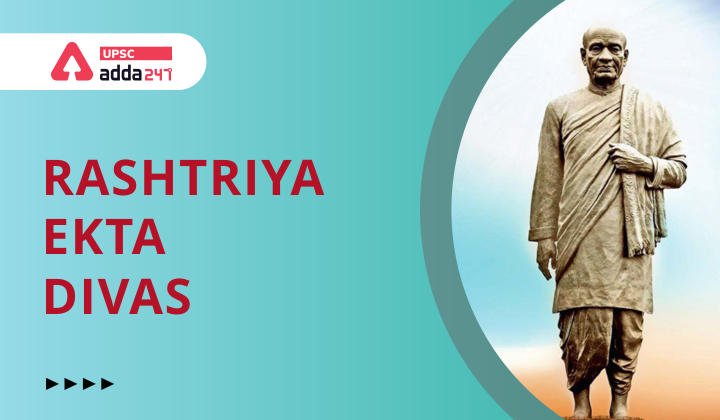Table of Contents
Rashtriya Ekta Divas- Relevance for UPSC Exam
- GS Paper 1: Indian History- Modern Indian history from about the middle of the eighteenth century until the present- significant events, personalities, issues.
Rashtriya Ekta Divas- Context
- The Country is celebrated Rashtriya Ekta Divas (National Unity Day) on 31st October to commemorate the birth anniversary of Sardar Vallabhbhai Patel.
- On this occasion, the Prime Minister of India paid rich tribute to Sardar Patel who dedicate his life to the ideal of ‘Ek Bharat Shreshth Bharat’.
- The Prime Minister said that ‘Ek Bharat’ is a Bharat that gives equal opportunities to women, Dalits, deprived, tribal, and forest dwellers.
- ‘Ek Bharat’ is a Bharat where housing, electricity and water are within the reach of everyone without discrimination.
Rashtriya Ekta Divas- Key Points
- About: Rashtriya Ekta Divas is being celebrated every year since 2014 with the aim to pay tribute to the ‘Iron man of India’ by remembering his extraordinary works for the country.
- Statue of Unity: Government constructed the Statue of Unity in Gujarat in 2018 to honour Sardar Vallabh Bhai Patel and his contribution towards ensuring National Unity.
- The Statue of Unity is the tallest statue in the world.
- Significance: The occasion of Rashtriya Ekta Divas provides an opportunity to re-affirm the inherent strength and resilience of the nation to withstand the threats to its unity, integrity and security.
Sardar Vallabhbhai Patel- Key Points
- Birth: Sardar Vallabhbhai Patel was born on 31st October 1875 in Nadiad, Gujarat.
- Key Contribution in freedom struggle:
- Elected as secretary of Gujarat sabha (congress wing in Gujarat) in 18917.
- Supported and participated in Gandhi jee-led Non-Cooperation Movement (NCM).
- Led Bardoli Satyagraha in 1928 and successfully secured farmers’ interests. Women of Bardoli gave him the title of ‘Sardar’ which means ‘a Chief or a Leader’.
- Presided the Karachi Session of Indian National Congress in 1931 where the party deliberated its future path.
Sardar Vallabhbhai Patel- Key Contribution after independence
- Sardar Vallabhbhai Patel was the first Home Minister and Deputy Prime Minister of India.
- ‘Operation Polo’: was launched by Sardar Patel to liberate and integrate Hyderabad in India in 1948.
- This was done after the Nizam of Hyderabad entertained false hopes of either joining Pakistan or remaining independent.
- Ensured integrity and unity of India: Sardar Patel is praised for effectively uniting all 562 princely states in pre-independent India to build a united Republic of India.
- He appealed to the people of India to live together by uniting in order to create Shresth Bharat (Foremost India).
- Father of Indian Civil Services: Sardar Patel is also remembered as the ‘Patron saint of India’s civil servants as he established the modern all-India services system.





 TSPSC Group 1 Question Paper 2024, Downl...
TSPSC Group 1 Question Paper 2024, Downl...
 TSPSC Group 1 Answer key 2024 Out, Downl...
TSPSC Group 1 Answer key 2024 Out, Downl...
 UPSC Prelims 2024 Question Paper, Downlo...
UPSC Prelims 2024 Question Paper, Downlo...




